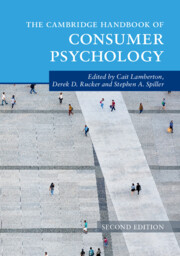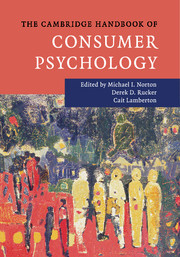28 results
Behavioral winter: Disillusionment with applied behavioral science and a path to spring forward
-
- Journal:
- Behavioral and Brain Sciences / Volume 46 / 2023
- Published online by Cambridge University Press:
- 30 August 2023, e156
-
- Article
- Export citation
Tables
-
- Book:
- The Cambridge Handbook of Consumer Psychology
- Published online:
- 30 March 2023
- Print publication:
- 06 April 2023, pp ix-x
-
- Chapter
- Export citation
Contents
-
- Book:
- The Cambridge Handbook of Consumer Psychology
- Published online:
- 30 March 2023
- Print publication:
- 06 April 2023, pp v-vi
-
- Chapter
- Export citation
1 - Consumer Psychology of Individuals
-
- Book:
- The Cambridge Handbook of Consumer Psychology
- Published online:
- 30 March 2023
- Print publication:
- 06 April 2023, pp 5-270
-
- Chapter
- Export citation
Contributors
-
- Book:
- The Cambridge Handbook of Consumer Psychology
- Published online:
- 30 March 2023
- Print publication:
- 06 April 2023, pp xi-xii
-
- Chapter
- Export citation
Copyright page
-
- Book:
- The Cambridge Handbook of Consumer Psychology
- Published online:
- 30 March 2023
- Print publication:
- 06 April 2023, pp iv-iv
-
- Chapter
- Export citation
2 - Consumer Psychology of Groups and Society
-
- Book:
- The Cambridge Handbook of Consumer Psychology
- Published online:
- 30 March 2023
- Print publication:
- 06 April 2023, pp 271-528
-
- Chapter
- Export citation
Figures
-
- Book:
- The Cambridge Handbook of Consumer Psychology
- Published online:
- 30 March 2023
- Print publication:
- 06 April 2023, pp vii-viii
-
- Chapter
- Export citation
3 - Methods for Understanding Consumer Psychology
-
- Book:
- The Cambridge Handbook of Consumer Psychology
- Published online:
- 30 March 2023
- Print publication:
- 06 April 2023, pp 529-640
-
- Chapter
- Export citation
Introduction
-
-
- Book:
- The Cambridge Handbook of Consumer Psychology
- Published online:
- 30 March 2023
- Print publication:
- 06 April 2023, pp 1-4
-
- Chapter
- Export citation
Index
-
- Book:
- The Cambridge Handbook of Consumer Psychology
- Published online:
- 30 March 2023
- Print publication:
- 06 April 2023, pp 641-658
-
- Chapter
- Export citation
11 - The Psychology of Consumer Social Hierarchy and Rank Signaling
- from 2 - Consumer Psychology of Groups and Society
-
-
- Book:
- The Cambridge Handbook of Consumer Psychology
- Published online:
- 30 March 2023
- Print publication:
- 06 April 2023, pp 309-330
-
- Chapter
- Export citation

The Cambridge Handbook of Consumer Psychology
-
- Published online:
- 30 March 2023
- Print publication:
- 06 April 2023
Contents
-
- Book:
- The Cambridge Handbook of Consumer Psychology
- Published online:
- 05 October 2015
- Print publication:
- 09 September 2015, pp v-vii
-
- Chapter
- Export citation
Appendices
- from 22 - Moral and Political Identity
-
- Book:
- The Cambridge Handbook of Consumer Psychology
- Published online:
- 05 October 2015
- Print publication:
- 09 September 2015, pp 610-618
-
- Chapter
- Export citation
Name Index
-
- Book:
- The Cambridge Handbook of Consumer Psychology
- Published online:
- 05 October 2015
- Print publication:
- 09 September 2015, pp 749-755
-
- Chapter
- Export citation
Part III - Societal Structures
-
- Book:
- The Cambridge Handbook of Consumer Psychology
- Published online:
- 05 October 2015
- Print publication:
- 09 September 2015, pp 505-748
-
- Chapter
- Export citation

The Cambridge Handbook of Consumer Psychology
-
- Published online:
- 05 October 2015
- Print publication:
- 09 September 2015
Tables
-
- Book:
- The Cambridge Handbook of Consumer Psychology
- Published online:
- 05 October 2015
- Print publication:
- 09 September 2015, pp ix-ix
-
- Chapter
- Export citation
Introduction
-
-
- Book:
- The Cambridge Handbook of Consumer Psychology
- Published online:
- 05 October 2015
- Print publication:
- 09 September 2015, pp 1-2
-
- Chapter
- Export citation



